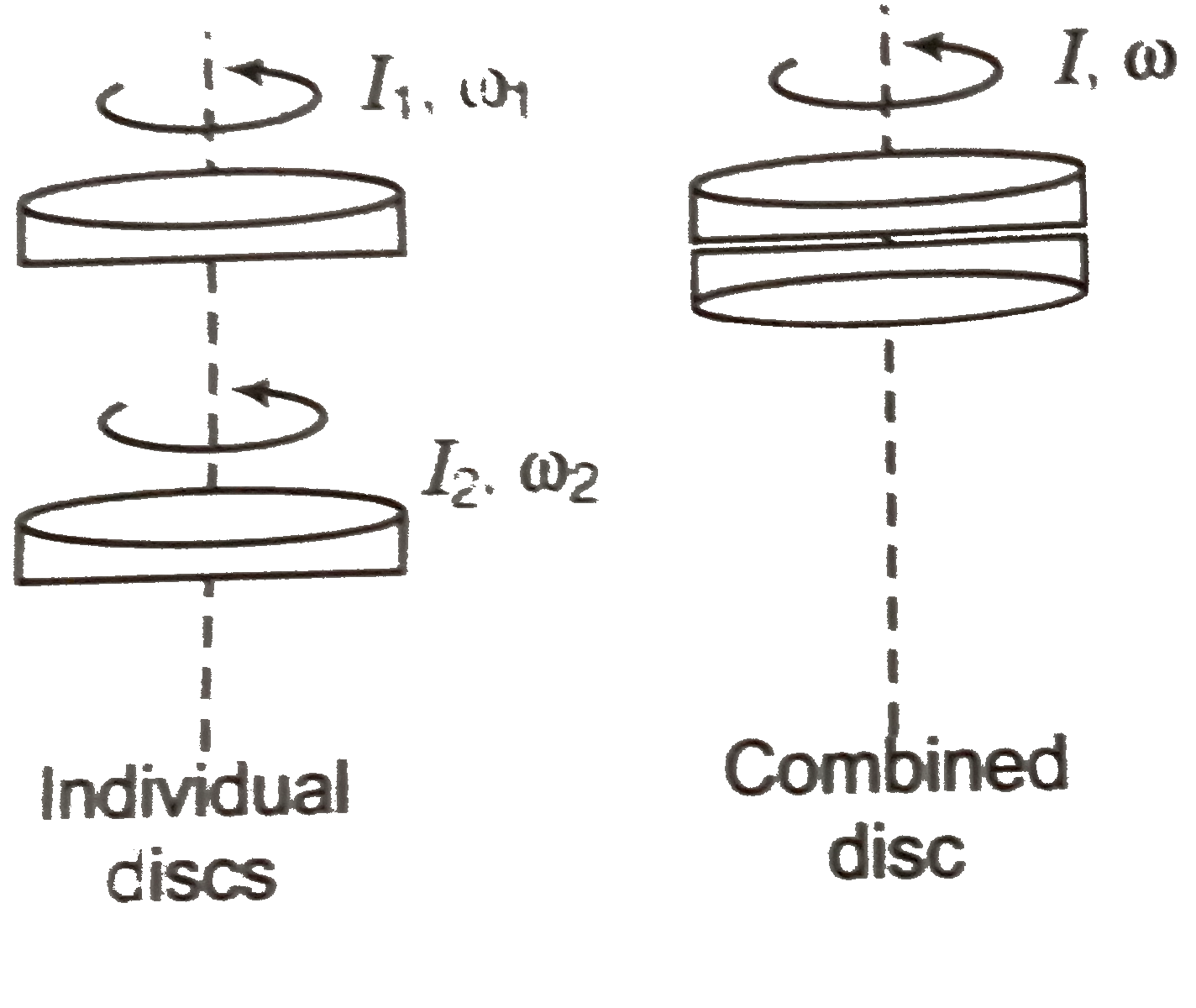Two discs of moments of inertia about their respective axes (normal to the disc and passing through the centre), and rotating with angular speeds are brought into contact face to face with their axes of rotation coincident. (a) What is the angular speed of the two-disc system? (b) Show that the kinetic energy of the combined system is less than the sum of the initial kinetic energies of the two discs. How do you account for this loss in energy? Take
Does the law of conservation of angular monentum apply to the situation ? Why ?
Find the angular speed of the two disc system .
Calculate the loss in kinetic energy of the system in the the process.
Account for this loss.
Consider the diagram below
let the common angular velocity of the system is
( A) yes , the law of conservation of angular momentum can be applied ,Because , there is no net external torque on the system of the two disc .
External forces , gravition and normal reaction ,act through th axis of rotation , hence produce no torque .

( B) BY conservation of angular momentum
(D) Hence there is loss in KE of the loss in kintic energy is mainly due to the work against the frication between the two discs.
Topper's Solved these Questions
- SYSTEM OF PARTICLES AND ROTATIONAL MOTION Book:NCERT EXEMPLARChapter:SYSTEM OF PARTICLES AND ROTATIONAL MOTION Exercise:very short answer type questions
Explore 18 Videos
- SYSTEM OF PARTICLES AND ROTATIONAL MOTION Book:NCERT EXEMPLARChapter:SYSTEM OF PARTICLES AND ROTATIONAL MOTION Exercise:very short answer type questions
Explore 18 Videos
- OSCILLATIONSBook:NCERT EXEMPLARChapter:OSCILLATIONSExercise:MULTIPLE CHOICE QUESTIONS (MCQs)
Explore 40 Videos
- THERMAL PROPERTIES OF MATTERBook:NCERT EXEMPLARChapter:THERMAL PROPERTIES OF MATTERExercise:Very short Answer type Questions
Explore 15 Videos
Similar Questions
Two discs of moments of inertia I1andI2 about their respective axes (normal to the disc and passing through the centre), and rotating with angular speed ω1andω2 are brought into contact face to face with their axes of rotation coincident (i) What is the angular speed of the two-disc system ? (ii) Show that the kinetic energy of the combined system is less than the sum of the initial kinetic energies of the two discs. How do you account for this loss in energy ? Take ω1≠ω2.
View SolutionTwo discs of moments of inertia I1andI2 about their respective axes (normal to the disc and passing through the centre), and rotating with angular speed ω1andω2 are brought into contact face to face with their axes of rotation coincident . What is the angular speed of the two-disc system ?
View Solution
Knowledge Check
Two discs of moments of inertia I1 andI2 about their respective axes (normal to the disc and passing through the centre), and rotating with angular speeds ω1 andω2 are brought into contact face to face with their axes of rotation coincident. (a) What is the angular speed of the two-disc system? (b) Show that the kinetic energy of the combined system is less than the sum of the initial kinetic energies of the two discs. How do you account for this loss in energy? Take ω1≠ω2
ADoes the law of conservation of angular monentum apply to the situation ? Why ?BFind the angular speed of the two disc system .CCalculate the loss in kinetic energy of the system in the the process.DAccount for this loss.Two discs of moment of inertia I1 and I2 about their respectively axes (normal) to the disc and passing through the centre) , and rotating with angular speed ω1 and ω2 are brought into contact face to face with their axes of rotation coincident .
What is the loss in kinetic energy of the system in the process ?AI1I2(ω1−ω2)22(I1+I2)BI1I2(ω1−ω2)2(I1+I2)CI1I2(ω1+ω2)2(I1−I2)DI1I2(ω1+ω2)22(I1−I2)Two discs of moments of inertia I1 and I2 about their respective axes (normal to the disc and passing through the centre), and rotating with angular speed ω1 and ω2 are brought into contact face to face with their axes of rotation coincident. What is the loss in kinetic energy of the system in the process?
AI1I2(ω1−ω2)22(I1+I2)BI1I2(ω1−ω2)2I1+I2CI1I2(ω1+ω2)2I1−I2DI1I2(ω1+ω2)22(I1−I2)
Two discs of moments of inertia I1andI2 about their respective axes (normal to the disc and passing through the centre) and rotating with angular speeds ω1andω2 are brought into contact face to face with their axes of rotation coincident.
(a) Does the law of conservation of angular momentum apply to the situation ? Why ?
(b) Find the angular speed of the two-disc system.
(c ) Calculate the loss in kinetic energy of the system in the process.
(d) Account for this loss.
View SolutionTwo discs have moments of intertia I1andI2 about their respective axes perpendicular to the plane and passing through the centre. They are rotating with angular speeds, W1andW2 respectively and are brought into contact face to face with their axes of rotation coaxial. The loss in kinetic energy of the system in the process is given by :
View SolutionTwo discs of moments of inertia I1 and I2 about their respective axes, rotating with angular frequencies, ω1 and ω2 respectively, are brought into contact face to face with their axes of rotation coincident. The angular frequency of the composite disc will be A.
View SolutionTwo discs of moments of inertia I1 and I2 about their respective axes , rotating with angular frequencies ω1 and ω2 respectively, are brought into contact face to face with their axes of rotation coincident. The angular frequency of the composite disc will be
View SolutionTwo discs of same moment of inertia rotating about their regular axis passing through centre and perpendicular to the plane of disc with angular velocities ω1 and ω2 . They are brought into contact face to face coinciding the axis of rotation . The expression for loss of energy during this process is
View Solution

